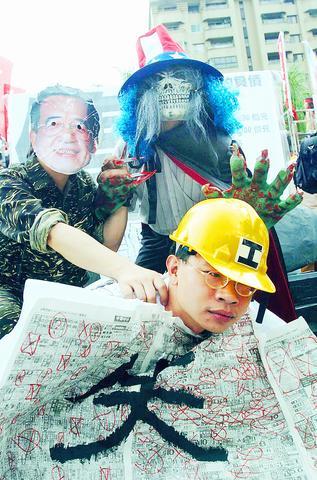Taiwan should rely on a Cold War-style "balance of terror" to safeguard national security in the face of intimidation from Beijing, Premier Yu Shyi-kun said yesterday in response to a rally against his proposed arms-procurement package.
"The best scenario will see a `balance of terror' being maintained across the Taiwan Strait so that the national security is safeguarded," Yu said. "If you fire 100 missiles at me, I should be able to fire at least 50 at you. If you launch an attack on ... Kaohsiung, I should be able to launch a counterattack on Shanghai."

PHOTO: CHIANG YING-YING, TAIPEI TIMES
Unfortunately, Yu said, during Chinese Nationalist Party (KMT) rule Taiwan failed to develop a counterattack capability comparable to that of Israel.
"That's why the NT$610.8 billion [US$18 billion] arms-procurement budget we're seeking from the legislature is necessary, because it'll keep us safe for at least 30 years, based on a study by the Ministry of National Defense," Yu said. "It seems like a good deal, because it'll cost an average of only NT$20 billion a year."
Yu said that the main purpose of the procurements was to sustain national development. Without it, he said, the nation may end up like Hong Kong.
"Arms procurement is necessary, otherwise many problems are bound to result, and it is our child-ren who will have to pay the price and shoulder the consequences," he said.
Responding to opposition criticism that the amount being spent was outrageously high, Yu called on the public to understand that US arms dealers were always going to make a profit from the deal.
"The US government is the only country in the world who has the guts to sell us weapons," Yu said. "We have to understand that it's a seller's market and that we have very limited space in which to haggle."
Cabinet Spokesman Chen Chi-mai (
"The weapons-procurement project is necessary because China has racked up double-digit increases to its military budget every year since 1995, while we have been cutting military spending," Chen said.
"We're very worried about the defeatism embraced by certain people. We hope they come to real-ize that there's no such thing as a free lunch: If you want peace and security, you have to pay for it," he said.
KMT Chairman Lien Chan (連戰), however, said that the time was not right for the legislature to handle the request and that the Cabinet should be using the budget for other things.
"The government should be allocating the nation's limited resources to solve urgent social problems such as unemployment, poverty and education to make the country a better place," he told the party's national congress yesterday morning.
Lien said that the amount the Cabinet requested would increase over time because of "maintenance fees."
Also See Story:
Thousands protest against arms deal

AIR SUPPORT: The Ministry of National Defense thanked the US for the delivery, adding that it was an indicator of the White House’s commitment to the Taiwan Relations Act Deputy Minister of National Defense Po Horng-huei (柏鴻輝) and Representative to the US Alexander Yui on Friday attended a delivery ceremony for the first of Taiwan’s long-awaited 66 F-16C/D Block 70 jets at a Lockheed Martin Corp factory in Greenville, South Carolina. “We are so proud to be the global home of the F-16 and to support Taiwan’s air defense capabilities,” US Representative William Timmons wrote on X, alongside a photograph of Taiwanese and US officials at the event. The F-16C/D Block 70 jets Taiwan ordered have the same capabilities as aircraft that had been upgraded to F-16Vs. The batch of Lockheed Martin

GRIDLOCK: The National Fire Agency’s Special Search and Rescue team is on standby to travel to the countries to help out with the rescue effort A powerful earthquake rocked Myanmar and neighboring Thailand yesterday, killing at least three people in Bangkok and burying dozens when a high-rise building under construction collapsed. Footage shared on social media from Myanmar’s second-largest city showed widespread destruction, raising fears that many were trapped under the rubble or killed. The magnitude 7.7 earthquake, with an epicenter near Mandalay in Myanmar, struck at midday and was followed by a strong magnitude 6.4 aftershock. The extent of death, injury and destruction — especially in Myanmar, which is embroiled in a civil war and where information is tightly controlled at the best of times —

China's military today said it began joint army, navy and rocket force exercises around Taiwan to "serve as a stern warning and powerful deterrent against Taiwanese independence," calling President William Lai (賴清德) a "parasite." The exercises come after Lai called Beijing a "foreign hostile force" last month. More than 10 Chinese military ships approached close to Taiwan's 24 nautical mile (44.4km) contiguous zone this morning and Taiwan sent its own warships to respond, two senior Taiwanese officials said. Taiwan has not yet detected any live fire by the Chinese military so far, one of the officials said. The drills took place after US Secretary

THUGGISH BEHAVIOR: Encouraging people to report independence supporters is another intimidation tactic that threatens cross-strait peace, the state department said China setting up an online system for reporting “Taiwanese independence” advocates is an “irresponsible and reprehensible” act, a US government spokesperson said on Friday. “China’s call for private individuals to report on alleged ‘persecution or suppression’ by supposed ‘Taiwan independence henchmen and accomplices’ is irresponsible and reprehensible,” an unnamed US Department of State spokesperson told the Central News Agency in an e-mail. The move is part of Beijing’s “intimidation campaign” against Taiwan and its supporters, and is “threatening free speech around the world, destabilizing the Indo-Pacific region, and deliberately eroding the cross-strait status quo,” the spokesperson said. The Chinese Communist Party’s “threats